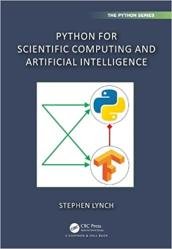Python for Scientific Computing and Artificial Intelligence
- Добавил: literator
- Дата: 27-04-2023, 20:35
- Комментариев: 0
 Название: Python for Scientific Computing and Artificial Intelligence
Название: Python for Scientific Computing and Artificial IntelligenceАвтор: Stephen Lynch
Издательство: CRC Press
Серия: The Python Series
Год: 2023
Страниц: 334
Язык: английский
Формат: pdf (true)
Размер: 27.7 MB
Python for Scientific Computing and Artificial Intelligence is split into 3 parts: in Section 1, the reader is introduced to the Python programming language and shown how Python can aid in the understanding of advanced High School Mathematics. In Section 2, the reader is shown how Python can be used to solve real-world problems from a broad range of scientific disciplines. Finally, in Section 3, the reader is introduced to neural networks and shown how TensorFlow (written in Python) can be used to solve a large array of problems in Artificial Intelligence (AI).
This book has developed from a series of university, national and international workshops that I have been delivering for over twenty years. It is based on the programming language Python, which is a high-level programming language and supports functional, imperative, object-oriented and procedural styles of programming. Probably the most important aspect of Python is that it is open source and completely free to the user. Python is currently the most popular programming language in the world from over 600 programming languages, and it is a relatively user-friendly language. The book is split into three sections. In Section 1, the reader is introduced to the Python programming language and it is shown how Python can aid in the understanding of A-Level (or High School) Mathematics. In Section 2, the reader is shown how Python can be used to solve real-world problems from a broad range of scientific disciplines and in Section 3, the reader is introduced to neural networks and shown how TensorFlow (written in Python) can be used to solve a large array of problems in Artificial Intelligence (AI). As well as learning the most popular programming language in the world, the reader will also be shown how Python can be used to perform computational mathematics to solve real-world problems. By the end of the book, the reader will be able to solve a great many mathematical problems without having to learn any of the theory of mathematics. The reader should note that the emphasis of the book is on programming and computational modeling and not on the mathematical theory.
This book was developed from a series of national and international workshops that the author has been delivering for over twenty years. The book is beginner friendly and has a strong practical emphasis on programming and computational modelling.
Features :
No prior experience of programming is required.
Online GitHub repository available with codes for readers to practice.
Covers applications and examples from biology, chemistry, computer science, data science, electrical and mechanical engineering, economics, mathematics, physics, statistics and binary oscillator computing.
Full solutions to exercises are available as Jupyter notebooks on the Web.
Support Material:
GitHub Repository of Python Files and Notebooks:https://github.com/proflynch/CRC-Press/
Скачать Python for Scientific Computing and Artificial Intelligence
Внимание
Уважаемый посетитель, Вы зашли на сайт как незарегистрированный пользователь.
Мы рекомендуем Вам зарегистрироваться либо войти на сайт под своим именем.
Уважаемый посетитель, Вы зашли на сайт как незарегистрированный пользователь.
Мы рекомендуем Вам зарегистрироваться либо войти на сайт под своим именем.
Информация
Посетители, находящиеся в группе Гости, не могут оставлять комментарии к данной публикации.
Посетители, находящиеся в группе Гости, не могут оставлять комментарии к данной публикации.
